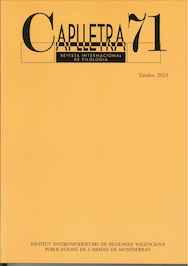In-service teachers’ language attitudes in the Valencian educational system: the effect of the school language programme and the L1
DOI:
https://doi.org/10.7203/caplletra.71.21034Keywords:
multilingual education, language attitudes, school language programme, L1, in-service teachers Abstract
Abstract
The study of teachers’ attitudes towards languages has received some attention, as multilingualism has become one of the main educational targets for European school systems (Cenoz 2019; Liyanage & Tao 2020). Several authors (Lasagabaster 2017; Safont 2007) have claimed that language attitudes may play a crucial role in multilingual education. In the Valencian educational system, existing research has examined both students’ language attitudes (Nightingale 2012, 2016; Portolés 2015) and pre-service teachers’ language attitudes (Lasagabaster & Safont 2008; Portolés 2014; Safont 2007) towards the three teaching languages (i.e., Catalan, Spanish and English). Yet, as far as we know, experienced teachers’ attitudes have not been investigated. Thus, the present preliminary study explores 21 in-service teachers’ language attitudes by means of a written questionnaire and a semi-structured interview. In so doing, data were collected in multilingual schools adopting three different school language programmes, namely those of a Catalan-based, a Spanish-based and an English-based language programme. The latter has been a context that has been omitted in previous research. The findings have confirmed the influence of the language programme on in-service teachers’ language attitudes as well as the paramount role of the L1 in the formation of language attitudes. Finally, our findings have pointed out that language attitudes and teaching practices do not always match since some monolingual views are found inside the classroom. Our study concludes that more teacher training is needed on the «Focus on Multilingualism» approach proposed by Cenoz and Gorter (2013).
 Downloads
Downloads
Downloads
Published
How to Cite
-
Abstract580
-
PDF371
Issue
Section
License
Authors submitting work to Caplletra for publication must be the legitimate holder of the usage rights. Legitimacy for the purposes of publishing the work must also include images, tables, diagrams and any other materials that may complement the text, whether they are the author of such material or not.
Copyright: on publishing their work in the journal, the author grants Caplletra. Revista Internacional de Filologia usage rights (reproduction, distribution and public communication) for both the paper printed version and for the electronic version.
All work published in Caplletra is covered by the Creative Commons license type Attribution-NonCommercial-NoDerivatives 4.0 (CC BY-NC-ND 4.0).
RESPONSABILITY
Caplletra. Revista Internacional de Filologia does not necessarily identify with the points of view expressed in the papers it publishes.
Caplletra. Revista Internacional de Filologia accepts no responsibility whatsoever for any eventual infringement of intellectual property rights on the part of authors.






